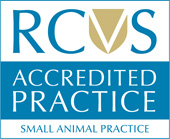Dog Neutering
At Boundary Vets, we advocate a “Fear-Free” practice, which means we are continually striving to make your pets visit as stress-free and as enjoyable as possible. We transfer this across to all areas, including neutering your dog.
We would recommend spaying your dog to help prevent unwanted pregnancies, phantom pregnancies, mammary tumours and a condition called pyometra which is an infection in the uterus which can be fatal if left untreated. At Boundary Vets we can spay your dog before their first season around six months of age or three months after their first season when all the blood vessels have returned to regular size.
Puppy Neutering & Spaying
The earlier time is usually recommended for smaller dogs, and the latter is generally recommended for large breeds of dog such as Great Danes and Saint Bernard’s to give their bodies a sufficient amount of time to develop and grow. Puppies receive anaesthesia when they are spayed or neutered and will be monitored continuously by a veterinary nurse throughout. The procedure takes up to two hours dependent on the size of your dog and involves the removal of the uterus and the ovaries. We also recommend neutering your male dogs if they are not too nervous; this is as it helps reduce unwanted pregnancies, the incidence of running away and prostate conditions as well as testicular cancers. Neutering your dog is a shorter procedure and takes approximately half an hour and involves removing both testicles.
Your dog will be provided with plenty of tender loving care and pain relief while they are kept in with us, and will be sent home with some pain relief, along with a set of comprehensive discharge instructions. They will also receive two complimentary checks with the nursing team to monitor their wound healing.
Cat Neutering
As a silver accredited cat-friendly practice, at Boundary Vets, we put your cats needs first. With cat-friendly handling and housing for your feline companion as well as many team members completing the Cat-Friendly Veterinary Professional course led by the International Society of Feline Medicine.
We will always advise getting your cat neutered as this can reduce many incidences, including fighting amongst neighbourhood cats and other cats in the household, and the prevention of unwanted pregnancies.
Kitten Neutering & Spaying
Cats become sexually mature at a young age; and as a result, means that they can start having kittens from as young as six months old. Not only is this a lot of strain on their young bodies, but their kittens may also begin producing kittens as well. One unneutered female cat can lead to the birth of over thirty cats in a year; this is not only a lot of mouths to feed but also a way for disease and parasites to spread quickly. Cats also contract a disease called FIV, (Feline immunodeficiency virus) which can be transmitted through bites and infected pregnant mothers to their kittens. Neutering your cat can significantly reduce the spread of the virus, which in some cases can be fatal.
At Boundary Vets, we can neuter your kitten from as young as four to five months old right through until adulthood. Performing a castration is a short and simple procedure which usually only takes a few minutes under general anaesthesia. Your feline friend would spend the day with us to ensure we can monitor their recovery. Spaying your female feline friend is also performed under general anaesthetic. Spaying a female is a more extended procedure as it requires the vet to enter the abdomen and remove the uterus and ovaries.
We will provide lots of pain relief in the hospital, and your cat will be sent home with some as well. We will also send them home with detailed discharge instructions to help you continue their care at home. Recovery time is usually ten days, where they should be kept in the house/indoors. Once your cat has been seen by a member of our nursing team, assessed and signed off, only then should they be allowed out to explore the outside world. Post-op care includes two post-op care check with the nursing team to assess the wound and give your cat a check over to help make sure their recovery is as comfortable and safe as possible.




